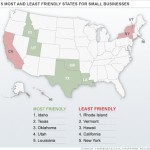CNN Poll: Idaho is Ranked the Friendliest State for Small Business
We always knew it to be true, but the rest of the world finally got a clue last week! Idaho is a terrific place to start a small business.
This article (top right) is “clipped” from the front page of the Wednesday May 9 2012 edition of the Coeur d’Alene Press.
Read more about the CNN Poll and its findings at
CNN Money: 5 friendliest states for small business
http://money.cnn.com/2012/05/08/smallbusiness/states-small-biz/index.htm
and
CDA Press: Idaho friendliest state for small businesses
http://cdapress.com/news/local_news/article_ad10bd78-9967-11e1-807f-001a4bcf887a.html
Read more about Small Business in Idaho on this blog:
NORTH IDAHO: Terrific Economic Climate for Business
originally posted at
http://www.realestate-browser.com/2012/05/17/cnn-poll-idaho-is-ranked-the-friendliest-state-for-small-business/
Expensive Real Estate Listings in the USA: Homes with Sports Facilities
Think OUR Real Estate market is pricey? Check out this Forbes.com article, featuring Luxury properties with Sports Facilities!
 Indoor Basketball Court, Summerlin, Nevada – John Giuffo – Forbes.
Indoor Basketball Court, Summerlin, Nevada – John Giuffo – Forbes.
USA Today: Housing Outlook is More Upbeat
We thought you would want to see this article… more encouraging news about the U.S. Housing Market! You can get the pdf version on our website: www.RealEstate-Browser.com/MarketNews
Housing outlook is more upbeat
Optimism is building that the housing industry is nearing a bottom — finally.
Home sales and home building are forecast to rise this year after sliding steeply the past five years in housing’s worst downturn since the Great Depression.
Recovery is expected to be slow, and home prices are widely expected to fall this year. But investors are betting on the start of an upturn, bidding up home builder stocks and causing them to outperform the broader stock market.
- MORE: Bartiromo: JPMorgan’s Jamie Dimon sees housing at bottom
- MORE: O.J. Simpson faces foreclosure on Miami house
Chief executives are more positive. JPMorgan Chase’s Jamie Dimon said last week that housing is near its bottom but could stay there a year. Stuart Miller, CEO of home builder Lennar, said the market has started to stabilize because of low prices and record-low interest rates.
Market researcher RBC Capital Markets has also turned from a “bearish” view on housing to saying that 2012 “will mark a step in the right direction.”
Many economists expect home prices to fall more this year because of foreclosures and other properties sold at very low prices.
As foreclosures pick up this year, “prices will drop,” says Stan Humphries, Zillow chief economist. He says home prices won’t bottom until later in 2012 or next year.
On average, prices have fallen by about a third since 2006.
“This year will feel a lot better to builders, investors and real estate agents than to consumers,” says Jed Kolko, economist for real estate website Trulia.
Housing’s outlook is brightening with signs of a better economy. Last month, U.S. employers added 200,000 jobs, and the unemployment rate fell to 8.5%, lowest in nearly three years.
While an economic shock could derail progress, “there’s now more evidence of improvement in the economy, and housing will follow the economy,” says David Crowe, chief economist at the National Association of Home Builders. More improvement is expected for:
•Sales. Existing home sales will rise 12% this year after a 2% increase last year, and new home sales, coming off a horrid year, will jump 74% this year, Moody’s Analytics predicts.
November’s existing home sales hit their highest mark in 10 months, and new home sales were the year’s second best, IHS Global Insight says.
•Construction. Single-family housing starts will rise 37% this year, Moody’s predicts, after falling 9% last year.
Home builder stocks are on a run. The S&P 1500 homebuilding index is up 38% since mid-October, vs. 7% for the S&P 500.
For more information about reprints & permissions, visit our FAQ’s. To report corrections and clarifications, contact Standards Editor Brent Jones. For publication consideration in the newspaper, send comments to letters@usatoday.com. Include name, phone number, city and state for verification. To view our corrections, go to corrections.usatoday.com.
<a title="Read it in USA Today" href="http://www.usatoday.com/money/economy/housing/story/2012-01-15/housing-outlook-2012/52584304/1" target="_blank">http://www.usatoday.com/money/economy/housing/story/2012-01-15/housing-outlook-2012/52584304/1 </a>

Randy and Christy Oetken Quoted about Coeur d’Alene Idaho in Language of Luxury Blog
Pristine and serene are words that best describe one of the most beautiful lakes in America. Yet, Lake Coeur d’Alene in Idaho is just one of 13 magnificent lakes in a mountainous region that includes the towns of Coeur d’Alene, Sandpoint and Hayden Lake. With 5 ski resorts within a short drive of these towns, the area is steadily gaining a reputation for quality of life that is unsurpassed, especially if you enjoy a full range of winter and summer recreational sports. Located just 30 minutes from Spokane International Airport, the Coeur d’Alene area is not just a destination for vacationers it is a great place to retire or simply call home.
LANGUAGE OF LUXURY BLOG – Language Of Luxury
REMINDER: Set your clocks BACK one hour tonight!
‘Fall Back’ Date from 2011 Daylight Savings Time Nov. 6 – Why do we do it?
– October 23, 2011Posted in: Entertainment 7
It’s almost time to ‘fall back’ again, with the end of daylight savings time for 2011, as the long days of summer give way to winter. This year the official end of daylight saving time is on November 6th at 2 a.m. local time.
For most Americans the time change means shorter days and less daylight in the evening after returning home from work. But for those who live in the states of Arizona and Hawaii, the fall back from daylight savings will go unnoticed, as these states do not participate in the time change.
At this time of year, and in March at the start of DST when we ‘spring ahead’ one hour, many ask why we use daylight saving time and where it came from. In a story last week (http://newstaar.com/2011-day-light-savings-time-end-date-approaching-%e2%80%93-how-and-why-did-it-begin/354473/), we looked into the question and here is what we found.
Some have traced the concept back to Ben Franklin who once wrote of how much would be gained by taking advantage of the longer days offered by the summer sun. Getting more done during daylight hours, literally saved one from ‘burning the midnight oil.’
According to reports, it was Germany who first adopted the daylight saving time change in an effort to save resources like coal being used for lighting. In 1918, the U.S. passed a federal law creating the daylight saving time standard for states wishing to participate.
To save resources during World War II, the time change became mandatory, and infact, from 1942 to 1945 the time change was in effect year round. The mandate was repealed at the end of the war.
http://newstaar.com/fall-back-date-from-2011-daylight-savings-time-nov-6-why-do-we-do-it/354526/
Don’t Forget: Fall Back Sunday November 6
This is the weekend!
We’d like to remind you about the Daylight Savings time change coming this weekend.
Set your clocks BACK one hour on Saturday night before you go to bed!
This is the time of year when you get an extra hour of sleep…
or you can be extra early to church or other regular Sunday Morning appointments! 🙂
http://independencetitle.com/EventsSchedulesHolidays/Daylight-Savings---Fall-Back-2011?&Sort=&Cat=1182&SubCat=327
HUD Extends Unemployed Mortgage Relief Program
Welcome to Kamiah – in Scenic North Central Idaho
We thought you might like to see this promotional video from the
Kamiah Chamber of Commerce
Come visit the Upper Clearwater area!
20 Acre Resort in Kamiah, Idaho
Let us help you OWN THE LIFESTYLE in Kamiah.
Call Randy Oetken
of Windermere Coeur d’Alene Realty
 Facebook
Facebook
 Twitter
Twitter
 Pinterest
Pinterest
 Copy Link
Copy Link







 Clock will ‘
Clock will ‘

